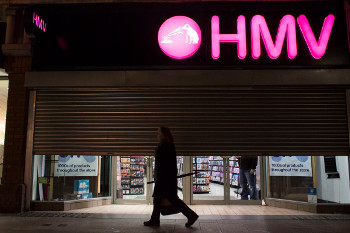Upward-only leases creating two-tier retail market

Until the Irish government grasps the nettle of upward-only rent reviews, many retailers will remain under severe pressure. Dan White reports
19 February 2013
January is always a wicked month for retailers. Coming just as the cash brought in by the pre-Christmas rush and the New Year sales hits their bank accounts, this is the month that lenders are most likely to move against troubled retailers.
This January was no exception. In the UK, venerable music retailer HMV went into administration while its 16 Irish stores were placed in receivership. While HMV’s 220 UK stores remain open for business the group’s Irish stores have been closed since the appointment of the receivers on 16 January.
Also biting the bullet in the UK was photographic retailer Jessops, which had 187 stores. All of the Jessops stores have been closed with the brand name and stock having been purchased by Dragons Den entrepreneur Peter Jones who plans to operate Jessops exclusively as an online operation.
Closer to home the chill winds of January also blew through the main streets and shopping centres. Women’s fashion retailer Pamela Scott, which has 24 shops throughout the country, placed 12 of these stores into examinership last month.
UK DIY retailer B&Q also appointed an examiner to its nine Irish stores in January.
The Pamela Scott and B&Q examinerships were both driven by the need to cut rents. Both chains find themselves locked into boom-time, upward-only leases. While these might have been bearable during the good times they are now utterly unsustainable. They are seeking to use the examinership process to repudiate such onerous leases.
They are not alone. They join several other leading retailers including Superquinn, Xtra-vision, Golden Discs, O’Brien’s Sandwiches and Atlantic Homecare who have used examinership and other insolvency processes to repudiate unsustainable, upward-only, boom-time leases.
An unsustainable retail market
With the creation of new upward-only leases having been outlawed since 2010, a dysfunctional and ultimately unsustainable retail market has emerged. On the one hand there are those retailers who have been able to exploit the various insolvency processes to reduce their rents to manageable levels, on the other those who are still locked into existing upward-only leases.
The problem with the abolition of upward-only leases in 2010 is that it only applied to new leases rather than existing ones. In practice very few, if any, retailers entered into upward-only leases after 2007 so banning new upward-leases was a pretty meaningless gesture. While the move may have played to the gallery it had no meaningful impact.
In their manifestos for the February 2011 general election both the parties in the current government promised to take measures to scrap existing upward-only leases, a promise that was repeated in the Programme for Government drawn up after the election.
Constitutional difficulties
Unfortunately, this is one promise that the coalition has failed to deliver on. In his December 2011 budget day speech Finance Minister Michael Noonan performed a U-turn on scrapping upward-only leases, claiming that the constitutional difficulties involved in introducing such a change were insuperable. To which one is inclined to respond: why not change the constitution?
Upward-only rent review leases became common in the 1970s in an attempt to mitigate the impact of the very high inflation of those years. Landlords argued, not unreasonably, that if their rents weren’t increased in nominal terms, rapidly rising prices would very quickly reduce the real value of the rents which they received to peppercorn levels.
Unfortunately what was appropriate in an era of high inflation is completely inappropriate in an era of deflation which has seen the value of non-motor retail sales fall by almost a quarter from their 2007 peak. There is also clear evidence that the arbitration process used to determine rent increases to be paid by tenants with upward-only leases, is hopelessly skewed in favour of landlords. Rents increased by an average of 240% between 2000 and 2007 while the consumer price index rose by "only" 30% over the same period.
So how do retail rents adjust to the new economic reality of permanently reduced consumer spending and the rise and rise of the internet? What should happen is that rents would fall to reflect this brave new world. Unfortunately upward-only rent reviews are making this impossible for many retailers.
Two-tier rental market
The result is the gradual emergence of a two-tier rental market. On the one hand are legacy retailers who are locked into upward-only leases, on the other retailers who either entered into leases after the boom burst or who have used the examinership process to repudiate existing leases and renegotiate lower, in some cases much lower, rents.
Throw in the rise and rise of the internet, with CSO figures showing almost two-thirds of all Irish people have used the internet to either purchase or seek information about goods and services, and this two-tier market looks increasingly like a dam that is about to burst. There is no way that existing legacy retailers trapped in upward-only leases can hope to compete with either those bricks and mortar retailers who have renegotiated their rents or online retailers. Something has to give.
With the government seemingly determined to protect NAMA and the banks, the likelihood is that the situation will have to get worse before it starts to get better. Already we have seen cases of retailers being pushed into examinership in order to remain competitive with rivals who have already done so – the B&Q examinership was preceded by the examinership of another DIY retailer, Atlantic Homecare, in July 2012. A key part of the Atlantic survival plan, which was approved by the High Court last September, was lower rents on its 11 surviving stores.
In the absence of moves to scrap upward-only rent reviews on existing leases, we are likely to see many more of these me-too examinerships. By the time the government belatedly wakes up to the need to do what needs to be done we can expect many more retailers to have followed January’s crop into insolvency.



 Print
Print






Fans 0
Followers